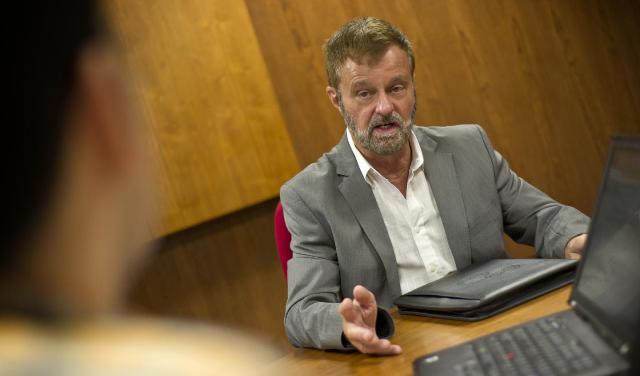Nov 25 2015
The American Institute of Aeronautics and Astronautics will honor professor Frank Lewis, head of the University of Texas at Arlington's Advanced Controls and Sensors Group, with the society's 2016 Intelligent Systems Award in recognition of his work to advance the capabilities of autonomous aircraft systems.
 This is UTA Professor Dr. Frank Lewis. Credit: University of Texas at Arlington
This is UTA Professor Dr. Frank Lewis. Credit: University of Texas at Arlington
The award specifically recognizes Lewis's contributions to intelligent neural-adaptive controls that mimic the neural networks in the brain, incorporating feedback mechanisms that improve the capacity of autopilots and ensure that autonomous aircraft follow prescribed trajectories.
Lewis, a fellow of the National Academy of Inventors and IEEE, also will be honored for his influential textbooks used by universities around the world during the AIAA Science and Technology Forum and Exposition scheduled Jan. 4-8 in San Diego, Calif.
"I am deeply honored receive this award from the world's most prestigious technical society dedicated to the global aerospace profession," Lewis said. "The area of intelligent systems is one that I have known and loved throughout my career, and it is humbling to be recognized for sharing my passion for innovation with others."
The neural-adaptive controls patented by Lewis and his collaborators and have been used widely by U.S. aerospace companies to develop highly reliable flight control applications for unmanned aircraft systems. Lewis's systems are currently incorporated into the Boeing Phantom ray unmanned aircraft and marketed by companies such as Guided Systems Technology, Inc.
"Frank Lewis's work to develop reliable, intelligent autonomous systems has laid the path for the integration of unmanned aircraft systems into the national airspace," Mickey McCabe, executive director of the UTA Research Institute said. "He is at the forefront of fields critical to the future of aeronautics, and his textbooks have enabled new generations of engineering students to benefit from his knowledge base and spirit of innovation."
Jonathan Bredow, professor and chair of the UTA Electrical Engineering Department, noted Lewis's current collaborative work with other faculty to develop controls that enable renewable energy microgrid users to disconnect from the centralized grid system and function autonomously in times of crisis such as storms or power outages.
"Dr. Lewis is a recognized authority within the electrical engineering community," Bredow said. "His versatility is truly remarkable."
Lewis joined the UTA College of Engineering in 1990 as the Moncrief-O'Donnell Chair of electrical engineering after earning advanced degrees from Rice University and Georgia Institute of Technology.
Since then, he has become a recognized international authority on intelligent feedback control systems and presents workshops and courses worldwide, including at Hong Kong Chinese University, National University of Singapore, Cambridge University, the Czech Academy of Sciences and others. He has published more than 300 journal papers and more than 400 refereed conference papers. He has more than 30,000 citations in Google Scholar.
Among the many awards he has received are the Fulbright Research Award, the Neural Network Society's Gabor Award and the UK Instrumentation and Control Honeywell Field Engineering Medal. He also is a fellow of the International Federation of Automatic Control IFAC and of the U.K. Institute of Measurement and Control.
In additional to research achievements, Lewis is an acclaimed professor who has won numerous awards for outstanding contributions and innovations in teaching, including the University of Texas System Regents' Outstanding Teaching Award, membership in the UTA Academy of Distinguished Teachers and the University's Graduate Dean's Excellence in Doctoral Mentoring Award.
He has supervised 48 Ph.D. students, including three National Science Foundation Career Awardees and one Homeland Security Career Awardee. His students are now leaders in academia and industry, and count among them the President of Bogaziki University in Turkey, the Provost of the University of New Mexico and the Vice Chancellor of the University of Hawaii System.
Lewis' Advanced Controls and Sensors Group focuses on controls design for robotic, aerospace and autonomous systems and has garnered 80 competitive research grants worth more than $9 million since 1990. Recent funding has come from the National Science Foundation, the U.S. Army Tank Automotive Research Development and Engineering Center, the Office of Naval Research and the Air Force Office of Scientific Research.
In the area of autonomous control, Lewis's key contribution has been to add additional self-learning mechanisms to neural networks by making it possible to design and tune the network based on the patterns of use or weights of different nodes in the system. The process provided greater reliability and stability to neural adaptive control.
Among his influential textbooks are "Aircraft Control and Simulation, " first published in 1992 and now in its third edition; "Optimal Control," published in 1995; and "Neural Network Control of Robot Manipulators and Non-Linear Systems" published in 1999 and one of the first textbooks on intelligent neural network control systems. He has written a total of 22 books, at least four of which are in common use as textbooks in universities round the world.
The American Institute for Aeronautics and Astronautics is the world's largest society dedicated to the global aerospace profession, with more than 30,000 members from 88 countries and 95 corporate members. The Intelligent Systems award was created in 2011.